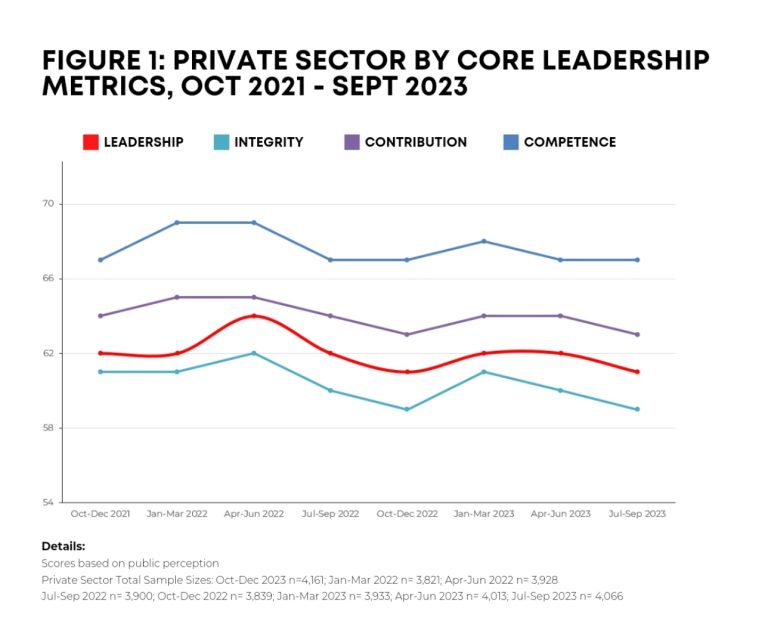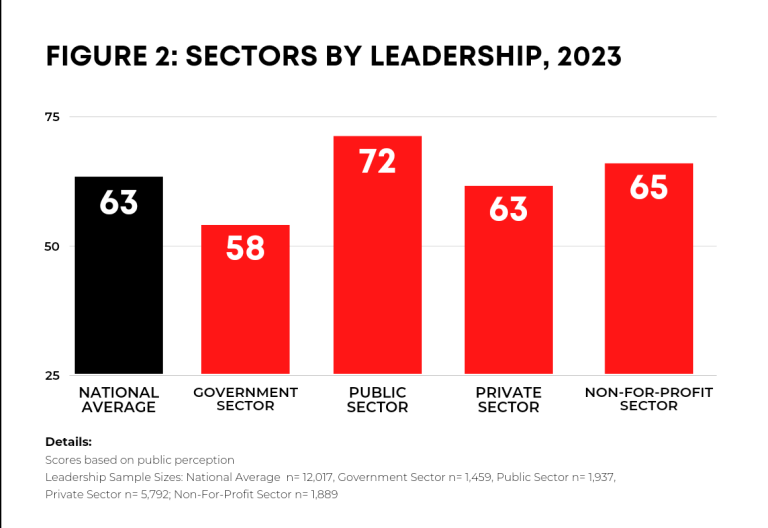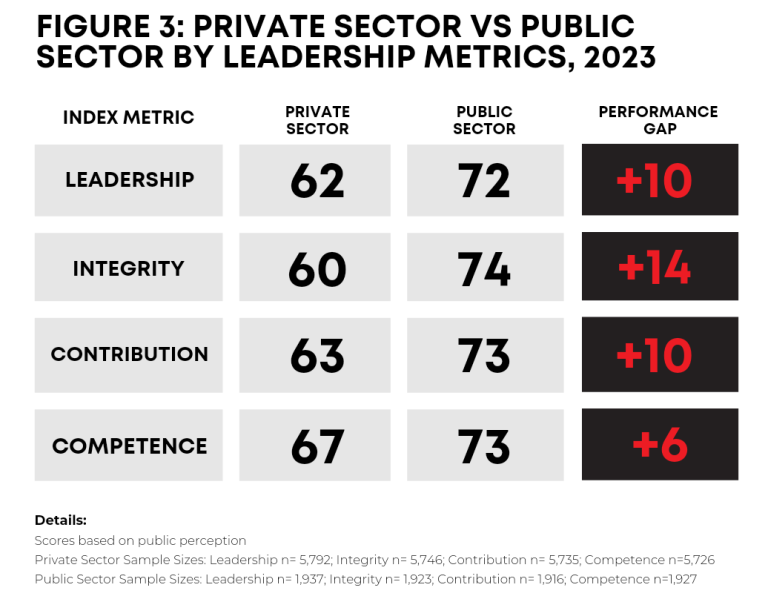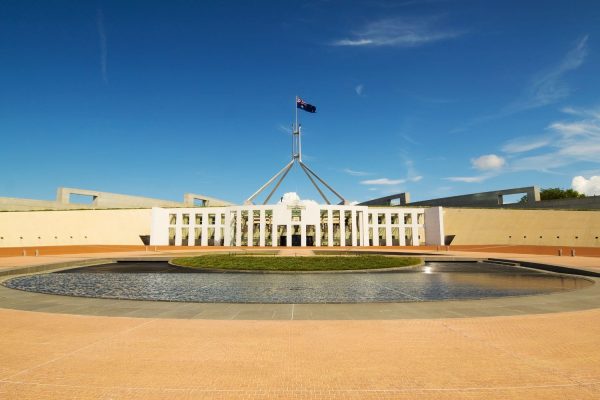The integrity of the private sector has been under siege in recent years, from Qantas selling tickets to COVID-cancelled flights to PwC using inside government contacts to rort the corporate tax system. Historically, our data has shown that the Australian public is distrustful of this sector, but had grown in public esteem built significant credit for their performance and contributions to society throughout the COVID-pandemic.
That credit and good will has now been eroded. With the public feeling the squeeze of high interest rates and inflationary pinch, reception to news of record corporate profits have not been positively received. Accusations of price gouging have been laid at the feet of airlines, supermarkets and the retail industry as a whole, while actions such as like Qantas’ lobbying of the government to prevent competition on international routes have further fostered concerns about the integrity of the not have not helped private sector and its commitment to the public interest integrity concerns.
As highlighted in a previous Australian Leadership Index article, private sector institutions are quick to engage in commit to virtue signalling actions, but recent behaviour appears to have shownraise Australians doubts about the private sector’s true coloursintentions. The public do not want a private sector that claims to support Indigenous Australia’s First Ppeoples while destroying ancient Aboriginal heritage sites. T, they want companies who perform to high standards while upholding their values and policies without trying to take shortcuts.
So how do private sector institutions work to improve their leadership perceptions and win back public enthusiasm for their services? In this article we take a look back at how leadership perceptions have changed in recent years, how the private sector institutions compare to their public counterparts and the actions some of Australia’s highest profile companies can take to both improve their public perceptions and create true benefits for serve the greater good.
SLIDING LEADERSHIP PERCEPTIONS AS FINANCIAL PRESSURES RAMP UP
Our survey data indicates that the Australian public sees the private sector as lacking in integrity but generally competent as a whole. It appears that the public believe retail companies, supermarkets, banks and the mining industry are capable of performing their core roles in Australian society, but with leadership that benefits a select few, rather than the collective common goodserves vested interests rather than the wider public interest.
This is highlighted in Figure 1 below, with all four of our core leadership metrics on a slide after reaching improved levels midway through 2022. There has been a clear downward turn in perceptions of private sector leadership this year, with perceptions of integrity a particular concern for private sector institutions institutions.within this sector:

There is no doubt that private sector institutions financially contribute to Australian society, and this is reflected in our data. But our research indicates that the public wants more than just big profits from our miners, airlines and banks: they want these bodies institutions to lead the way on sustainability issues, tech innovation and the health and wellbeing of society, needs felt all the more acutely when the public is feeling the economic pinch.
When Australia’s biggest companies match their actions to the mission statements on their websites, these perceptions of the business sector will improve, and improve as will perceptions of leadership in Australia as a whole.
DECLINING PERCEPTIONS OF LEADERSHIP ACROSS THE COUNTRY
The Australian Leadership Index was started in response to the poor the pervasive sense that we are not well served by our social institutions. perceptions of leadership in this country, and this is not limited to the private sector. As highlighted in Figure 2 below, perceptions of government leadership in Australia has been particularly poor in 2023.
Both state and federal governments have been been plagued with integrity scandals of their own, as well as competence concerns in the wake of failed initiatives like the Voice To Parliament.

If private sector institutions want to improve their leadership perceptions, they might ’consider how and why theirll need to stop emulating government bodies and start replicating the actions and behaviour of their public sector counterparts are seen as both well-intentioned and possessing the competence to enact their good intentions – both major drivers of public trust.
Our survey data indicates that the public believes public sector institutions are capable, contributing well to Australian society and generally trustworthy, as shown below in Figure 3. While these institutions do not operate with the for-profit pressures of their private sector counterparts, they do a better job of maintaining their integrity and committing to the values outlined by leadership without corporate moral grandstanding.

Figure 3 clearly shows where the biggest gap is for private sector leadership: improving integrity. Australians see the public and private sector as competent overall, but only the public sector is able to operate with public trust.
This isn’t to say that more safeguards are needed to protect society from the profit motives of the private sector; instead, the public just wants to see our largest companies business operate without putting those create profits without harming the ahead of serving the collective greater good. Maintaining that integrity while committing to competent operations will see private sector leadership perceptions improve sharply, supporting the economic benefits they already bring to Australian society.
CREATING PRIVATE SECTOR LEADERSHIP THAT BENEFITS THE GREATER GOOD, NOT JUST EXECUTIVES AND SHAREHOLDERS
Organisations in the private sector are facing some critical leadership challenges in 2023, but these issues are not without solutions.
To improve their leadership perceptions private sector institutions need to realign their valuescommit to fostering the public interest in word and deed; to makeand make commitments that they can stick with, not just what sounds good on a press release. The public is aware that the private sectors primary purpose is to generate profits for shareholders, but there is a strong desire for contributions beyond financial success.
Making commitments to sustainability, cultural inclusivity and charitable causes are all fantastic initiatives, but when companies try to avoid tax or operate outside the law, it not only hurts the organisation but ultimately undermines public trust in the private sector. Without that trust, the public will not be able to support Australian organisations in the long-term.
With that trust, the private sector in Australia will continue to grow with a public proud to promote some of the biggest miners in the world and the famous red flying kangaroo.




